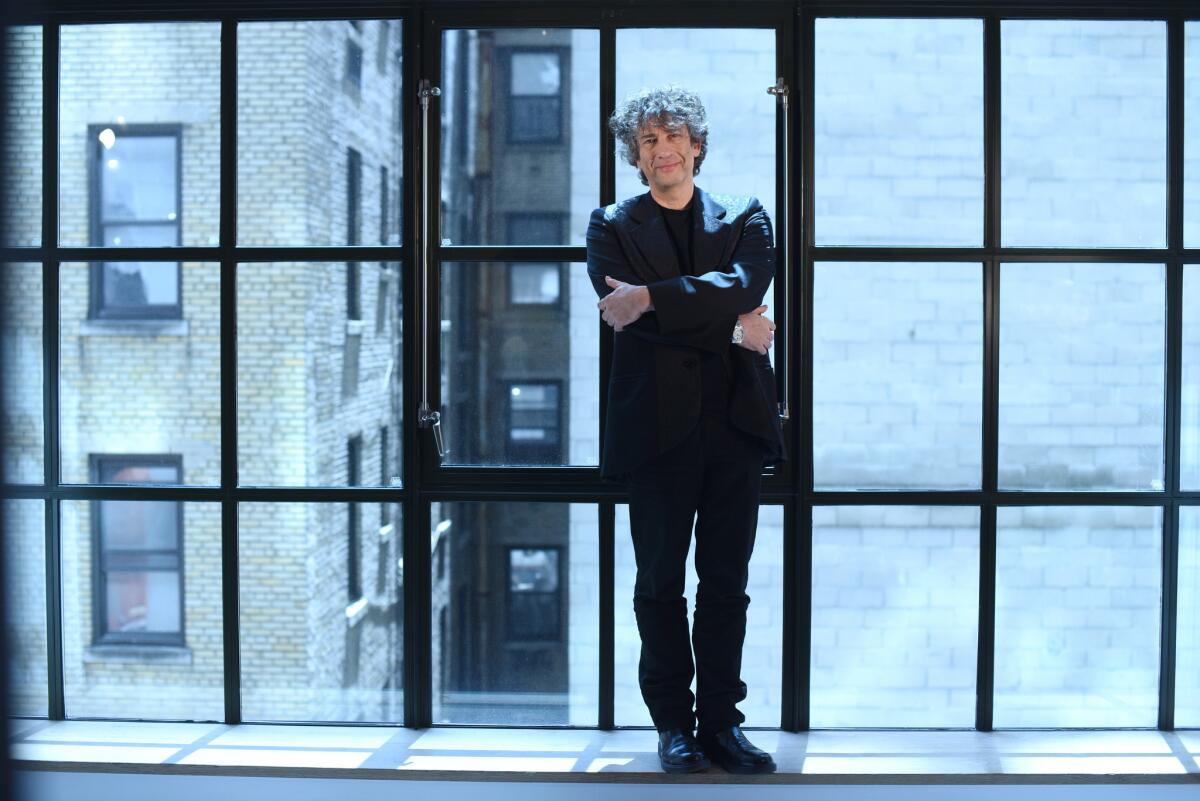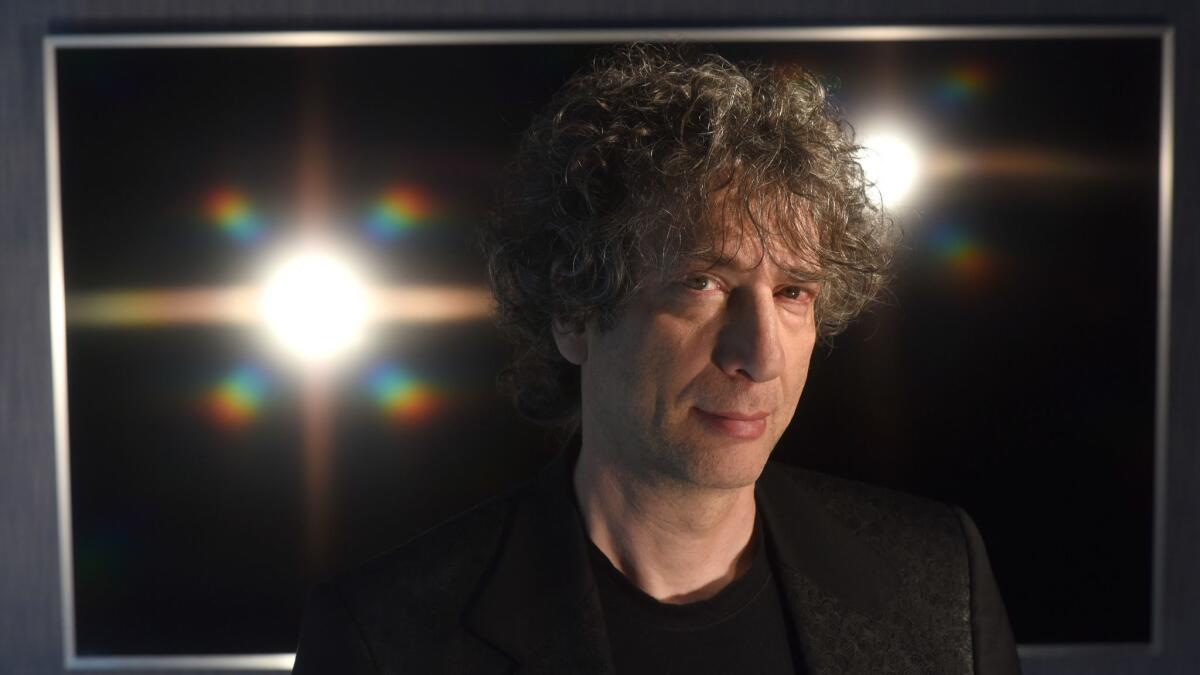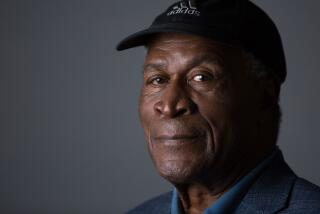Q&A: Neil Gaiman promised a dying friend he’d carry ‘Good Omens’ forward

- Share via
Reporting from New York — Neil Gaiman has thrived for decades on entertainment’s fringe, crafting novels (“American Gods”), comics (“The Sandman”) and YA books (“Coraline”) about gods, monsters and parents with button eyes. But as he stood in Times Square recently, promoting Amazon Prime’s adaptation of “Good Omens” (co-written with the late Terry Pratchett), it seemed a tectonic shift had occurred. There he was, surrounded by satanic nuns singing Queen songs (watch “Omens” for context) and massive billboards promoting the show, wondering just how all this happened.
The Envelope chatted with the tousled, black-clad, 58-year-old in charge of one of TV’s more creatively quirky endeavors to help puzzle it all out.
Your fingerprints are all over TV these days — “Good Omens,” “American Gods,” the feature “How to Talk to Girls at Parties” and “Lucifer.” How did you engineer a takeover of TV?
I have no clue. When I started doing this about 35 years ago, I was making weird stuff out on the fringe. I existed in this dichotomous place of “Neil Gaiman? Never heard of him” and a very tiny subset of “Neil Gaiman, my favorite writer.” But those [latter] people were weird people; they had tattoos, they were not mainstream. Somewhere in there, the tide’s gone out. It’s this weird feeling that mainstream caught up with me rather than the other way around.
It must be hugely validating.
I landed here in this place at this time because I made a promise to my friend [Pratchett] that I’d make our book into television that he’d watch before he died. And all I’m thinking here is, “My God, Terry would love this.” And if he were here, he’d find a way to make this even funnier and weirder and goofier. He would have said, “What we really need is this rubber chicken.”
Terry, who died in 2015, made this deathbed request of you to craft “Good Omens” for the screen. How did that come about?
Terry wrote me an email: “I know how busy you are, but you’re the only other person on this planet who has the same understanding of and passion for the old girl [‘Omens’] that I do. You have to do this. And you have to do this so that I can watch it before the lights go out.” … We thought we had maybe five years of Terry left — but then he went into a coma and died. And suddenly, this thing I had said to my friend was a last request. As a way of dealing with the grief, I started writing [the teleplay for] “Good Omens.”
You’re one of the few who’ve had your books adapted for TV; on “Omens,” you’re showrunning for the first time. You’ve also got another “Gods” book in mind — even as that Starz series continues airing. What’s your take on how “Game of Thrones” ended before George R.R. Martin could complete his series?
I look at that with absolute fascination. With each of the showrunners who’s come in for “American Gods,” I’ve said, “I have to brief you on the book that will come next, because there are hooks built in that you might not put on screen if you don’t know.” For me, it’s almost as if [the “GOT” showrunners] went off and made their own version. I’d be looking at it going, “That’s so interesting; my book isn’t going to be this.”
“Omens” was your first novel, but your first authorship was actually a 1984 biography of Duran Duran. Were you a huge fan?
I’m more of a fan now than I was then. I got a phone call from a rock publisher who said, “We understand you’re a writer and we’d like you to write a rock biography for us.” I’m like, “I’d love to do the Velvet Underground, Lou Reed, maybe Elvis Costello.” And they said, “Would you like to do Barry Manilow, Def Leppard or Duran Duran?”

“Omens” has eaten up a lot of the last few years and delayed a lot of your other projects. Would you ever be a showrunner again?
I promised my wife [musician Amanda Palmer] I wouldn’t do it again. Or I wouldn’t do it again like this. There was an awful lot of just not getting much sleep. But “Good Omens” wouldn’t be what it is if I hadn’t. It feels handmade. It’s the biggest thing the BBC has ever made, but it’s still peculiarly small and very, very personal.
This isn’t even the first time someone’s tried to make “Omens,” is it?
No, Terry and I had been brought out to [Los Angeles] to talk about it in 1991 and they put us up in the Chateau Marmont, which was not the lovely, fancy place it is now. They said they wanted us to have a “real Hollywood experience.” And I remember Terry saying, “Frankly, given the choice between a ‘real Hollywood experience’ and functional plumbing, I would have gone for the plumbing.”
More to Read
From the Oscars to the Emmys.
Get the Envelope newsletter for exclusive awards season coverage, behind-the-scenes stories from the Envelope podcast and columnist Glenn Whipp’s must-read analysis.
You may occasionally receive promotional content from the Los Angeles Times.










